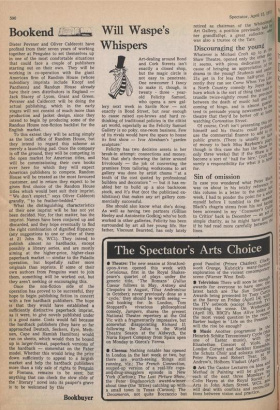Bookend
Dieter Pevsner and Oliver Caldecott have profited from their seven years of working together at Penguins to set themselves up in one of the most comfortable situations that could face a couple of publishers starting out on their own. They will be working in co-operation with the giant American firm of Random House (whose subsidiary imprints include Knopf and Pantheon) and Random House already have their own distributors in England — Jack Stacey of Lyom, Grant and Green. Pevsner and Caldecott will be doing the actual publishing, which in the early stages will not consist of much more than production and jacket design, since they intend to begin by producing some of the Random House non-fiction backlist for the English market.
To this extent they will be acting simply as the local office of Random House, but they intend to regard this schemeas merely a launching pad. Once the company is off the ground, they will be competing in the open market for American titles, and will be commissioning their own books over here for which they will expect American publishers to compete. Random House will be treated as the most favoured customer, and in return they expect to be given first choice of the Random House titles which would best suit their imprint. "We don't expect," says Oliver Caldecott grandly, "to be feather-bedded."
What the distinguishing characteristics of their new imprint will be has not yet been decided. Nor, for that matter, has the imprint. Names have been conjured up and discarded, and they hope eventually to find the right combination of dignified flippancy (any suggestions to one or other of them at 21 John St, WC1). They intend to publish almost no hardbacks, . except possibly a library series, and are mostly aiming at the higher-price, higher-class paperback market — similar to the Paladin operation, but hopefully rather more originals than reprints. ff some of their own authors from Penguins want to join them, something will be worked out, but they aren't seeking or encouraging this.
Once the non-fiction side of the operation has proved to be successful, they hope to begin publishing fiction in concert with a few hardback publishers. The hope is that they would have established a sufficiently distinctive paperback imprint, as it were, to give novels published under it a good name. Costs would fall because the hardback publishers (they have so far approached Deutsch, Seckers, Eyre, Methuen, Cape and Hamish Hamilton) would run on sheets, which would then be bound up in larger-format, paperback versions of the hardback — somewhat on the Faber model. Whether this would bring the price down sufficiently to appeal to a largish market and help the hardback publishers more than a tidy sale of rights to Penguin or Fontana, remains to be seen; but anything that can check the slow slide of the ' literary ' novel into its pauper's grave is to be welcomed by this
Bookbuyer


































 Previous page
Previous page